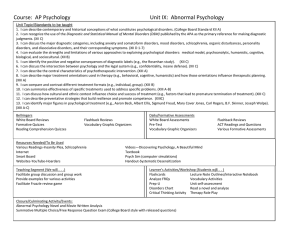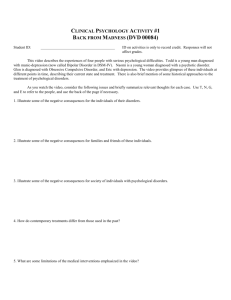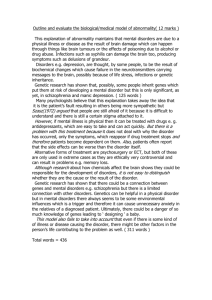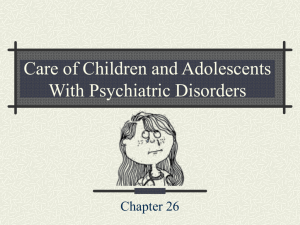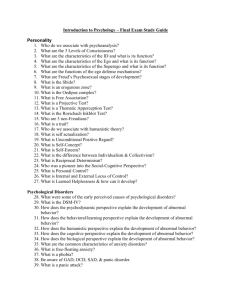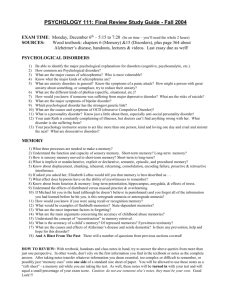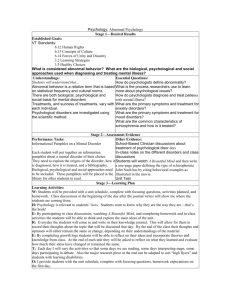Abnormal Psychology Learning Targets and Vocabulary
advertisement
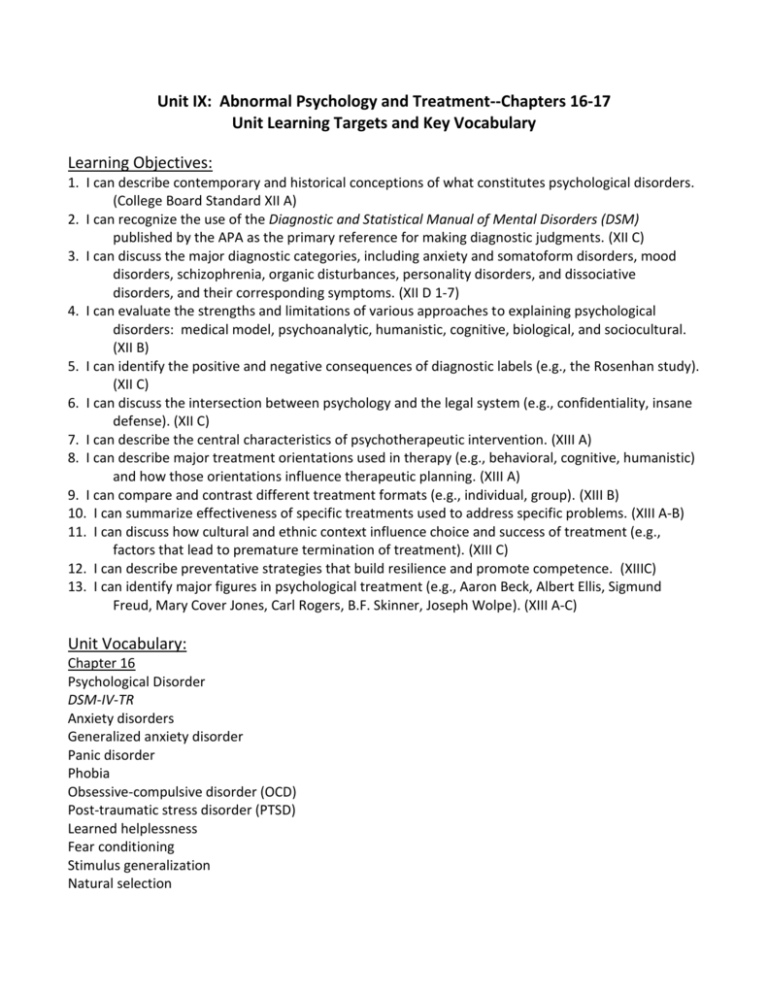
Unit IX: Abnormal Psychology and Treatment--Chapters 16-17 Unit Learning Targets and Key Vocabulary Learning Objectives: 1. I can describe contemporary and historical conceptions of what constitutes psychological disorders. (College Board Standard XII A) 2. I can recognize the use of the Diagnostic and Statistical Manual of Mental Disorders (DSM) published by the APA as the primary reference for making diagnostic judgments. (XII C) 3. I can discuss the major diagnostic categories, including anxiety and somatoform disorders, mood disorders, schizophrenia, organic disturbances, personality disorders, and dissociative disorders, and their corresponding symptoms. (XII D 1-7) 4. I can evaluate the strengths and limitations of various approaches to explaining psychological disorders: medical model, psychoanalytic, humanistic, cognitive, biological, and sociocultural. (XII B) 5. I can identify the positive and negative consequences of diagnostic labels (e.g., the Rosenhan study). (XII C) 6. I can discuss the intersection between psychology and the legal system (e.g., confidentiality, insane defense). (XII C) 7. I can describe the central characteristics of psychotherapeutic intervention. (XIII A) 8. I can describe major treatment orientations used in therapy (e.g., behavioral, cognitive, humanistic) and how those orientations influence therapeutic planning. (XIII A) 9. I can compare and contrast different treatment formats (e.g., individual, group). (XIII B) 10. I can summarize effectiveness of specific treatments used to address specific problems. (XIII A-B) 11. I can discuss how cultural and ethnic context influence choice and success of treatment (e.g., factors that lead to premature termination of treatment). (XIII C) 12. I can describe preventative strategies that build resilience and promote competence. (XIIIC) 13. I can identify major figures in psychological treatment (e.g., Aaron Beck, Albert Ellis, Sigmund Freud, Mary Cover Jones, Carl Rogers, B.F. Skinner, Joseph Wolpe). (XIII A-C) Unit Vocabulary: Chapter 16 Psychological Disorder DSM-IV-TR Anxiety disorders Generalized anxiety disorder Panic disorder Phobia Obsessive-compulsive disorder (OCD) Post-traumatic stress disorder (PTSD) Learned helplessness Fear conditioning Stimulus generalization Natural selection Anterior cingulate cortex Dissociated Identity Disorder (DID) Mood disorders Major depressive disorder Bipolar disorder Mania Linkage analysis Norepinephrine Serotonin Frontal lobe Hippocampus Social-cognitive perspective—stable, global and internal Cycle of depressed thinking Schizophrenia Delusions Hallucinations Flat effect Positive and negative symptoms Subtypes of Schizophrenia—Paranoid, Disorganized, Catatonic, Undifferentiated, Residual Chronic or process schizophrenia Acute or reactive schizophrenia Dopamine Glutamate Personality disorders Types of Personality disorders—avoidant, schizoid, histrionic, narcissistic, borderline, Antisocial personality disorder Chapter 17 Psychotherapy Biomedical therapy Eclectic approach Psychoanalysis Free association Resistance Dream analysis Transference Psychodynamic therapy Humanistic therapy Client-centered therapy Nondirective therapy Active listening Behavior therapy Counterconditioning Exposure therapy Virtual reality exposure therapy Aversive therapy Token economy Cognitive therapy Rational Emotive Therapy Family therapy Light exposure therapy Psychopharmacology Antipsychotic drugs Anti-anxiety drugs Antidepressant drugs Electroconvulsive therapy Lobotomy Mary Cover Jones Joseph Wolpe Systematic desensitization
